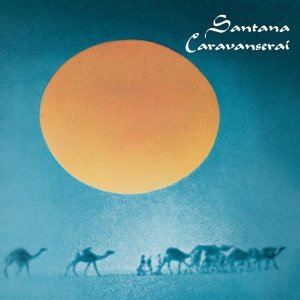
Many people coming into the Neo-Pagan movement are far too young to remember when this album came out. Go back and find it – you won’t regret it.
Carlos Santana moved toward a more spiritual phase in his life and approached producer Clive Davis about doing an album of a different nature. He may have been encouraged to make this album after listening to the 1969 recording of “Bitches Brew” by Miles Davis with the epic keyboardist Joe Zawinul, one of the most influential jazz-fusion recordings of all time.
“Caravanserai” stands out as one of the most dreamy, mystical albums ever recorded. While there’s plenty of drumming on the album, the predominantly instrumental music is well outside of the pop-rock category. Instead there’s a fusion of rock, jazz, and Afro-Cubano-Latin drumming that offers extremely early musical ideas about spirituality and traveling through other worlds on a road of sound. Needless to say, cuts on this album didn’t get put on heavy rotation at radio stations. Fans enjoyed this at home while sitting in front of massive JBL speakers with bongs or Mr. Natural close at hand.
The recording opens with “Eternal Caravan of Reincarnation.” The intro opens with the sound of crickets, followed by a bizarre saxophone sounds pushed through a wave generator. A bass line enters with a jaunty tango-like riff. Carlos comes in with long, drawn-out guitar chords that float over the layers of sound. It just gets better and better. “Waves Within” bends back to Santana’s early style, fusing Latino rhythms and his trademark moaning, crying guitar riffs with Hammond organ. Track 3, “Look Up (To See What’s Coming Down)” is purely funkadelic. A sexy little bass chop riff with wah-wah pedal underscores a driving organ lead. “Just in Time to See the Sun” (track 4) gets alchemical. The group swells to a huge crescendo, and a vocalist finally joins the sound. “Song of the Wind” moves the trajectory into outer space. Chimes and a gentle guitar melody go weightless over the organ and laid-back drumming. On “All the Love in the Universe,” the band sweeps toward a second climax. Vocalists join the song, singing “everybody needs a helping hand.”
The album downshifts on “Future Primitive,” which prefigures the Hearts of Space sound by a good twenty years. Alien sounds jettison the listener into a weird world. Wild percussion cranks up the energy while the outer-space background sounds persist. “Stone Flower” is perhaps the most famous track of the LP. The song begins with a lengthy intro that provides the groundwork for the vocalist. Organ riffs duel with guitar riffs in a complex back-and-forth of melodic statements. “La Fuente del Ritmo” returns to a more traditional Santana sound, with layers of driving Afro-Cubano-Latino percussion. A piano ostinato introduces Carlos on the guitar – more wailing and moaning guitar riffs ensue with drama and power. The album ends with “Every Step of the Way” (9:01 minutes). It’s a subtle and quiet yet nonetheless energetic musical statement. Here is a clear fusion of jazz and rock, planned composition and spontaneous improvisation. Three minutes into the track, the music shifts into a fully expressed guitar melody driven onwards by the pulsing demands of percussion and the rising tides of the organ and background accompanists. The percussionists cut loose as a crazed flutist takes his turn.
This is a jazz-fusion classic but its nature is so spiritual and mystical that it’s not to be missed by younger generations of Neo-Pagan listeners. It will rock you to the outer limits of your soul and show you the gateway to heaven.
~review by Elizabeth Hazel
CBS Records/Columbia, 1972.
Multiple formats available. The digitally re-mastered analog recording is probably the best bet.
Approx 51 minutes
